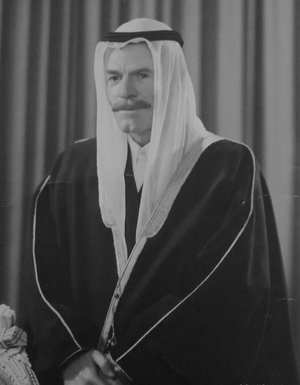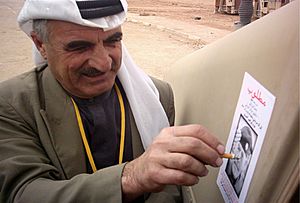Izzat Ibrahim al-Douri facts for kids
Quick facts for kids
Izzat Ibrahim al-Douri
|
|
|---|---|
|
عزة إبراهيم الدوري
|
|

Portrait of Izzat Ibrahim al-Douri
|
|
| Secretary General of the National Command of the Arab Socialist Ba'ath Party | |
| In office 30 December 2006 – 25 October 2020 |
|
| Preceded by | Saddam Hussein |
| Succeeded by | Salah Al-Mukhtar |
| Regional Secretary of the Iraqi Ba'ath Party | |
| In office 3 January 2007 – 25 October 2020 |
|
| Preceded by | Saddam Hussein |
| Succeeded by | Unknown (most likely Mohammed Younis al-Ahmed) |
| Deputy Secretary of the Regional Command of the Iraqi Regional Branch | |
| In office September 1991 – 3 January 2007 |
|
| Preceded by | Taha Yassin Ramadan |
| Succeeded by | Unknown |
| Vice President of Iraq | |
| In office 16 July 1979 – 9 April 2003 Serving with Taha Yassin Ramadan (after 1991)
|
|
| President | Saddam Hussein |
| Preceded by | Taha Muhie-eldin Marouf and Saddam Hussein |
| Succeeded by | Taha Yassin Ramadan |
| Vice Chairman of the Revolutionary Command Council | |
| In office 16 July 1979 – 9 April 2003 |
|
| President | Saddam Hussein |
| Preceded by | Saddam Hussein |
| Succeeded by | Post abolished |
| Member of the Regional Command of the Iraqi Regional Branch | |
| In office October 1966 – 9 April 2003 |
|
| Personal details | |
| Born | 1 July 1942 Ad-Dawr, Saladin, Iraq |
| Died | 25 October 2020 (aged 78) |
| Political party | Iraqi Ba'ath |
| Spouses | Jawhar Majid Khalil and four other wives |
| Children |
|
| Nickname | Ghost |
| Military service | |
| Allegiance | |
| Branch/service | Iraqi Army |
| Years of service | 1962–2003 |
| Rank | |
| Unit | Political Guidance Directorate |
| Commands | 2nd Infantry Division (1977–1981) |
| Battles/wars | Iran–Iraq War
2003 invasion of Iraq
|
Izzat Ibrahim al-Douri (Arabic: عزة إبراهيم الدوري, romanized: Izzat Ibrāhīm ad-Dūrī; 1 July 1942 – 25 October 2020) was an Iraqi politician and a high-ranking Army officer, known as a Field Marshal. He held a very important position as Vice Chairman of the Iraqi Revolutionary Command Council until 2003. This was when the United States and its allies entered Iraq. He was seen as a close helper and second-in-command to President Saddam Hussein. After 2003, he became a leader of a group called the Naqshbandi Army.
Al-Douri was one of the most well-known officials from the Ba'ath Party who was not captured after the 2003 events. He was even featured as the "king of clubs" in a special deck of most-wanted Iraqi playing cards. He continued to lead groups that fought against the forces that entered Iraq and later against the government in Baghdad. After Saddam Hussein was no longer in power in December 2006, al-Douri was named the new leader of the Iraqi Ba'ath Party in January 2007.
Contents
Early Life and Political Beginnings
Izzat Ibrahim al-Douri was born in 1942 in a place called Al-Dour, which is close to the Iraqi town of Tikrit. His parents were Ibrahim Khalil al-Douri, a farmer, and Hamdah Saloum al-Douri. His family was part of the Al-Shuwaikhat clan, which belongs to the Jabour tribe.
He was sometimes called "the Iceman" because he used to sell blocks of ice. Even though he only went to primary school, he became interested in politics when he was a teenager. He became friends with Saddam Hussein in 1963. They both worked in the early intelligence part of the Ba'ath Party. They also took part in the 17 July Revolution in 1968, which was a big change in Iraq's government.
Role in the Ba'athist Government
Al-Douri became a very important person in the Ba'athist government under Saddam Hussein. This was partly because both he and Saddam came from the same tribal area near Tikrit. When the Ba'ath Party took control in 1968, al-Douri was made the interior minister. In this role, he helped the Ba'ath Party become stronger by reducing the power of other political groups, like the Iraqi Communist Party.
Before 2003, al-Douri became the vice chairman of the Iraqi Revolutionary Command Council. This position gave him a lot of power and influence in Iraq's government. He was involved in important decisions and events during this time.
As a top leader, al-Douri was involved in the wars Iraq had with Iran and Kuwait. He was also involved in putting down uprisings within Iraq, such as the one led by the Iraqi marsh Arabs in 1991.
In 1993, al-Douri took part in a government program called the "Return to Faith Campaign." This program aimed to encourage people in Iraq to be more devoted to Islam. It brought Islamic ideas into Iraqi media, schools, and the legal system.
Al-Douri was also a member of a religious group called the Naqshbandi Order. He used his position in the government to help the Naqshbandi community in Iraq. This support later helped lead to the creation of the Army of the Men of the Naqshbandi Order, a group he would later lead.
After the Ba'ath Regime and Later Years
On March 20, 2003, forces led by the U.S. entered Iraq. This led to the fall of Saddam Hussein's government on April 9, 2003. After the capital city of Baghdad fell, al-Douri went into hiding. U.S. officials believed he was involved in the fighting that followed, known as the Iraqi insurgency. They said he helped direct and fund attacks against U.S. forces. He was also thought to have helped create an alliance between former Ba'ath Party members and other armed groups.
Al-Douri played a role in the Northern Offensive in 2014 as a commander of the Naqshbandi Army. There were reports that he had connections with the group ISIL. He was said to have helped them take the city of Tikrit and plan attacks against Iraqi security forces. His connections with some armed groups in Iraq were believed to have started even during Saddam's time.
Many people pointed to al-Douri as one of the main leaders who helped rebel groups take control of northern Iraq and the city of Mosul in June 2014.
On April 7, 2016, a video was released showing him in military uniform, reading a statement. In the video, he asked people in Iraq to fight against certain groups and against Iranian influence in Iraq. He also spoke about the role of the United States in the situation.
In April 2018, Izzat Ibrahim al-Douri released another video. In this video, he spoke about the 71st anniversary of the Ba'ath party.
Al-Douri was reported to have died in battle on April 17, 2015. This was during a large military operation by Iraqi forces and other groups near the Al-Alaas oil fields. However, the Iraqi Ba'ath party denied his death. Later, al-Douri appeared in videos talking about events that happened after his reported death. He officially died on October 25, 2020.
Some reports, like one from NRT News, mentioned that an Iraqi politician named Hassan Alawi met al-Douri in the Kurdistan region of Iraq multiple times, even as recently as August 17, 2021. This suggested that he might have been alive longer than officially reported.
Personal Life
Izzat Ibrahim al-Douri was married five times. He had a large family with 24 children in total: 13 daughters and 11 sons.
Images for kids
See also
 In Spanish: Izat Ibrahim al Duri para niños
In Spanish: Izat Ibrahim al Duri para niños
 | John T. Biggers |
 | Thomas Blackshear |
 | Mark Bradford |
 | Beverly Buchanan |



